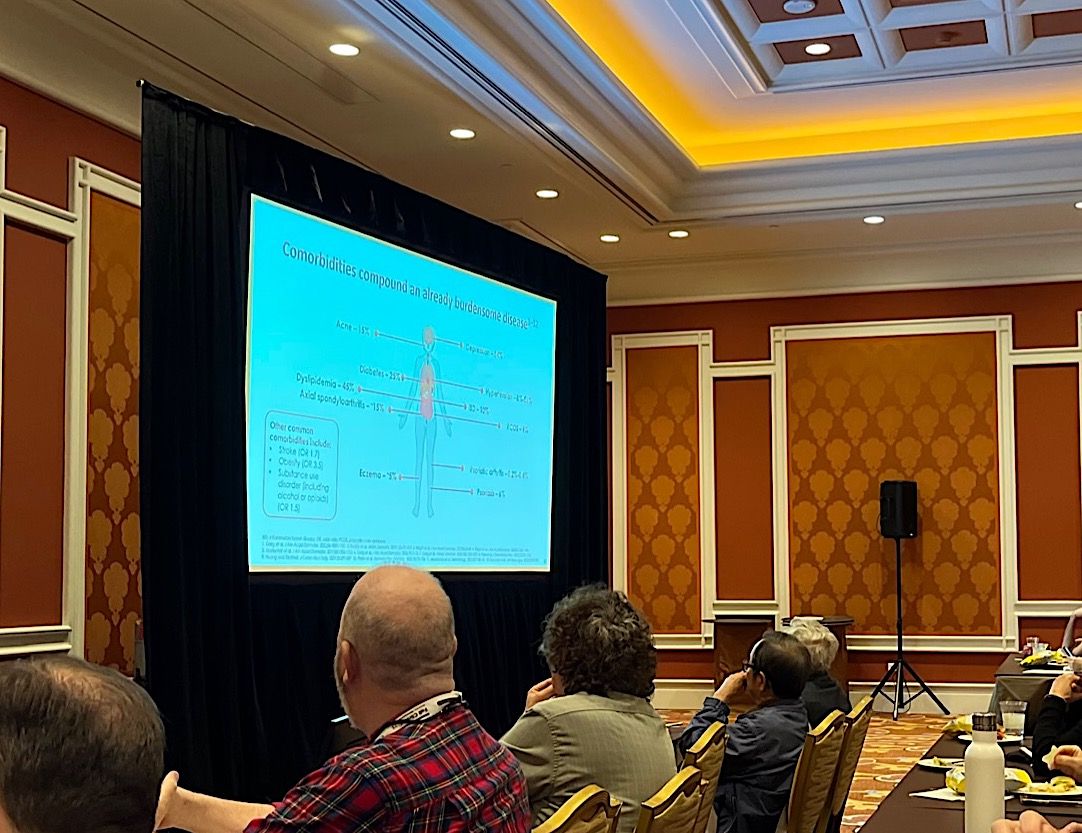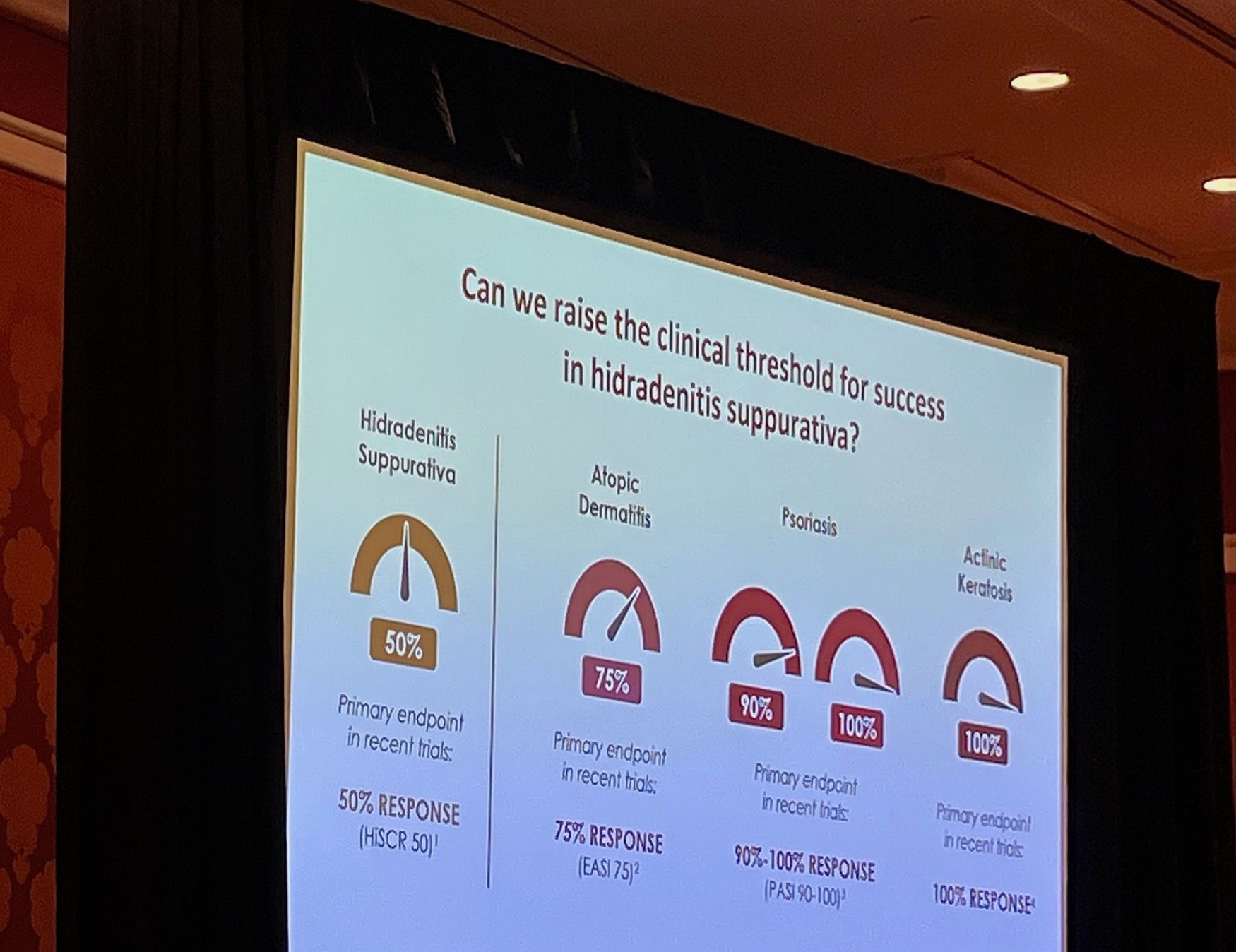News
Article
The Present and Future of Treatment of Hidradenitis Suppurativa
Author(s):
This presentation at the Fall Clinical Dermatology conference in Las Vegas explored the topic of advancements in HS treatment.

At the 2023 Fall Clinical Dermatology Conference in Las Vegas, G. Michael Lewitt, MD, gave a detailed presentation on the treatment of hidradenitis suppurativa (HS).
Lewitt is known for his dermatology practice at the Illinois Dermatology Institute, where he practices general medical, surgical, and cosmetic dermatology and has interests in specifically treating complex psoriasis and other dermatologic emergencies.
Lewitt began his presentation with a video featuring a patient with HS who chose to tell her story and explain the ways in which opening up about the disease had affected her life. The woman featured in the video expressed her desire and the desire of other HS patients to see better representation and to feel less isolated due to their condition.
“You know, we see how these patients are fighting for each other, for those afflicted by hidradenitis suppurativa to get the care and attention they deserve,” Lewitt said. “And as providers, you know, the baton needs to pass to us and we need to take the lead on doing that.”
During the talk, Lewitt explained some of the key facts about HS he felt were important to highlight for dermatologists in attendance at the conference.

“HS is a lot more common than we realize,” he noted. “I've seen anywhere from 0.1 up to 1% just in the United States alone, and why might that number be lower than 1%? Well, a couple reasons. This diagnosis has about a 7 - 10 year delay, so we might be missing those adolescents with what have been diagnosed like bacterial folliculitis or carbuncles or any of those that are not HS.”
Lewitt added that HS occurs in puberty and added that what he views as a really interesting fact to remember about HS is that it behaves extremely similarly in the adolescent population as it does in the adult population.
“Women are 2 times more commonly afflicted than men, even without things like premature adrenarche, adrenal hyperplasia, or other associated factors that we know,” he said. “And then African American patients have about a 3 times higher prevalence compared to Caucasian patients. So you know, we have a lack of access to care that plays a part in delayed diagnosis and treatment for these patients, as well as awareness.”
Lewitt later highlighted a survey of almost 1300 HS patients, and the results showed that around 61% of patients afflicted by HS expressed their pain was either moderate or severe. He pointed out that the pain, shame, and embarrassment that HS can cause impacts mental health and intimate relationships for patients.
“Take an extra minute and ask 3 questions: number one, does your HS ever affect what you can wear, clothing that you'd like to put on in the summer and you can’t,” he said. “Two, if you want to work out, are you ever nervous to go to the gym because of the way you look and feel and because it hurts? And then three, I ask about the elephant in the room. Sexual health is very important, so make it easy: Does this condition ever make you nervous to want to go on a date or to be intimate with your partner?”

Later in his talk, Lewitt discussed treatment of HS and progress made in the field.
“Currently, we only have 1 nonsurgical treatment that is approved for hidradenitis suppurativa,” Lewitt said. “...So, what is my favorite recommendation in terms of treatment? You can use multiple treatments at once on a patient, and you don’t have to use monotherapy. So there is a place for antibiotics. There is a place for surgical intervention.”
Lewitt even cited a study from Europe highlighting that patients on biologics that had surgical interventions, versus those not on biologics, had longer intervals of clarity after surgery. Despite the FDA approval for only 1 nonsurgical treatment, Lewitt recommends adalimumab as early as early stage 1.
He further explained the reticence some patients have with regard to biologics, in part due to television commercial warnings with lists of potential side effects. Lewitt noted the importance of alleviating patient fears regarding the use of early biologic intervention.
“Patients face an absolute number of obstacles before they actually get to a biologic therapy,” he said. “Number one, delayed diagnosis due to low awareness. Misdiagnosis and underreporting. Again, up to 1%, and I think it's probably a lot more than that. Delayed referrals or difficulty obtaining disease counseling.”
Additionally, Lewitt explained that many patients with HS lack awareness about HS guidelines, and many clinicians also will need to remain updated on the latest guidelines for the skin disease.
“Why for hidradenitis are we still looking at a high score of 50%?” he asked. “We need loftier goals from us, and loftier goals from our patients in order to push innovation in this disease state.”
The quotes contained in this description were edited for the purposes of clarity.





